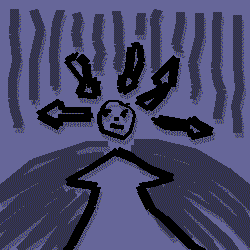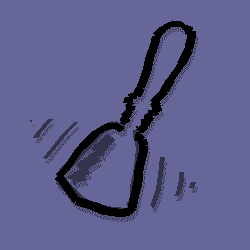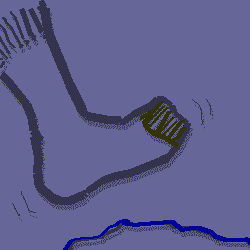I've been sitting on this for over a week trying to decide how to approach the material in a humorous fashion. The problem was every time I thought about it I became angry. Not spitting mad, but definitely steam-rising-out-of-my-shirt angry. More like a fume than an explosion. All because of a few press releases on Monday, October 10th. So I'm not going to use humor, and I'm not going to be mad. However, you are in for a long essay. Hope you have a good attention span; you'll need it. As usual, I love to read your feedback so please take some time to let me know what you think.
A Plethora of Press ReleasesBright and early on a beautiful Monday morning I discovered that AD/HD was a figment of my imagination. I didn't have hyper-focusing issues. I didn't have a hard time finishing projects that I started. I wasn't easily distracted. I didn't have a problem tuning out background noise, being on time, etc. Nor did I have difficulty controlling my impulses or temper. That time years ago when I was in a hurry, ran out the door, and jumped on the wrong bus wasn't the result of crossed wires in my mind, a chemical breakdown or neurotransmitters, or a lack of impulse control. No, all of this was the result of a corrupt psychiatry industry hell bent on pushing pills down my throat. Thanks to an enlightened series of articles by
OfficialWire, a professional and unbiased news agency that
welcomes criticism, AD/HD is no more and we can all go about our business just feeling like incompetent losers.
Of course, that's not what the press releases were trying to make me feel, but that's what they accomplished. It started with...
United Nations Warns Against Psychiatric Labeling And DruggingThat seemed reasonable. My own life was turned topsy turvy because of psychiatric drugging. The article started off rational:
In its Concluding Observations on reports by Australia, Finland and Denmark regarding their compliance to the U.N. Convention on the Rights of the Child, the Committee expressed concern that “[ADHD] and Attention Deficit Disorder (ADD) are being misdiagnosed and therefore psycho-stimulant drugs are being over prescribed, despite growing evidence of the harmful effects of these drugs.”
But the article took a turn into the twilight zone for me very quickly.
Brian Beaumont, spokesperson for the Vancouver Chapter of the Citizens Commission on Human Rights said, “The UN, the FDA, Health Canada and the European Commission should be encouraged to seek out and eradicate the source of the problem—psychiatrists who have misled governments, medical agencies and the public into believing ADHD actually exists. There is no brain scan, blood test, X-Ray or ‘chemical imbalance’ test to verify the existence of so-called ADHD. Psychiatry’s false marketing campaign is destroying children’s lives.”
Wait a minute there, cowboy.
"So-called ADHD?" No brain scan? I distinctly remember having wires all over my head while being "scanned" almost 15 years ago. The doctors came in and said
"Tell us about your depression." My first thought wasn't
"What a scam!" It was
"How did they know I was feeling down?" Then they showed me the results of the scan comparing my brain to a "normal" brain. Whether their analysis was correct or not is one thing, but to claim
"There is no brain scan..." is patently false. Perhaps he meant to say
"there is no brain scan we acknowledge as being accurate"? But that's a reasonable dispute and this article was hardly reasonable. It was filled with railing accusations.
I discovered other press releases, all at
OfficialWire, that covered the same subject.
British Columbian Children Are Being Falsely Labeled And DruggedPsychiatry’s mind-altering drugs are given to thousands of British Columbian school children simply because they are bored. They’re hyper, not because their brains don’t work right as psychiatrists tell us, but because they can become bored, fidgety and frustrated simply because they have attempted to study something that is unreal to them or they have run into something they cannot comprehend because of words they do not understand. They can become bored to tears, and children who are bored and misunderstand things fidget, wiggle, scratch, stretch, gaze out windows, yawn, drift off etc. and (especially if they are boys) start looking for ways to get into trouble."
Boredom and miscomprehension is not the only reason children can exhibit symptoms of the invented disorder known as ADHD. Perfectly normal children who are over-active (have a lot of energy), rebellious, impulsive, day-dreamers, sensitive, undisciplined, bored easily (because they are bright), or who have undergone other improper teaching techniques, can also be inattentive, impulsive, or so called hyperactive.
That set off my
Things That Make You Go Hmmm![]()
alarm. The premise was right, but their conclusions were over the top, simplistic, and insensitive in my opinion.
Group Says Psychiatric Diagnoses Are A HoaxPeople do experience problems and upsets in life that may result in mental troubles, sometimes very serious. But to represent that these troubles are caused by incurable "brain diseases" that can only be alleviated with dangerous pills is dishonest, harmful and often deadly. Such drugs are often more potent than a narcotic and capable of driving one to violence or suicide. They mask the real cause of problems in life and debilitate the individual, so denying him or her the opportunity for real recovery and hope for the future.
I couldn't dispute that statement. In fact, I agreed with it's sentiment. But this next statement was a bit sensationalistic for me...
While it doesn't provide medical or legal advice, it works closely with and supports medical doctors and medical practice. A key CCHR focus is psychiatry's fraudulent use of subjective "diagnoses" that lack any scientific or medical merit, but which are used to reap financial benefits in the billions, from Medical Services Plans and ultimately taxpayers. Based on these false diagnoses, psychiatrists justify and prescribe life-damaging treatments, including mind-altering drugs, which mask a person's underlying difficulties and prevent his or her recovery.
They were on a roll, because this came out at the same time as well:
Group Says Teenagers Have Been Stigmatized And Targeted To Be Drugged For Profit By PsychiatryMembers of the Citizens Commission on Human Rights (CCHR™) started to flood various school areas in the lower mainland with free public service brochures entitled: “Let's Talk about Psychiatry Hooking Your World on Drugs”, “The Hoax of Learning and Behavior Disorders” and “How You Can Protect and Preserve your Mental Health”.
The brochures warn children and parents of the damage that can be caused through the use of psychiatry and their drugs and also reveal that all drugs, whether cocaine, heroin, or psychiatric drugs, are brain altering. The brochures also point out that mental problems are not inherited. They are not based on your genes or a "chemical imbalance in your brain" - as psychiatrists attempt to make people believe. They are not a physical disease. You cannot look at them under a microscope, brain scan or x-ray.
The pamphlets show that the psychiatric industry has seduced well-meaning parents, teachers and others into believing that their bogus diagnoses actually exist. While mainstream physical medicine deals with diseases such as malaria, bronchitis and hepatitis that have exact identifiable physical causes, psychiatry deals with disorders. Disorders are simply names given to undesirable feelings and behavior for which no exact physical causes have been isolated.
Brian Beaumont, spokesperson for the Vancouver chapter of the Citizens Commission on Human Rights said, “Psychiatrists are the biggest drug pushers there are. Psychiatry is not a profession or a science but an industry that labels and drugs children, for profit. When it comes to psychiatry, the bottom line is the almighty buck. The psychiatric industry has invented enough ‘disorders’ to label and drug every normal healthy childhood activity there is. Attention Deficit Disorder, Mathematical Disorder, Writing Disorder, Oppositional Defiance Disorder, Obsessive Compulsive Disorder, ad nauseam, are all bogus psychiatric diagnoses aimed at increasing psychiatry's cash cow by creating a false need for their services. This is fraud and child abuse.”
Started to flood? It all began to sound like a campaign to me. I looked back and noticed that all press releases were written by Brian Beaumont for the Citizens Commission on Human Rights (CCHR),
"established in 1969 by the Church of Scientology to investigate and expose psychiatric violations of human rights." Now we had a campaign with an agenda. What seemed at first to be sensible statements turned out to be the handiwork of a lobby group. Not only that but Brian Beaumont often quoted himself in the third person in his own press releases as an authority. This was just bizarre to me.
Some statements seemed reasonable, such as a dependence on drugs to solve one's problems often precludes one actually solving the problem. In my opinion, medicating ourselves prevents us from learning to use ADHD as an asset as opposed to treating it as a detriment. And I believe pharmaceutical companies are vultures pushing dangerous, hastily tested medications on a trusting public. These companies have only started playing nice because so many of America's citizens have been damaged that the FDA has had to step in with new regulations. But to state that all psychiatrists are charlatans diagnosing bogus maladies like
"so-called ADHD" on an unsuspecting public for profit is too disingenuous.
The issue at hand is not as black and white as the CCHR states. Not all psychiatrists are evil, though I believe many of them are egotistical blowhards pushing their pet psychosis on their trusting patients. Not all drugs are bad, though there are many, many abuses. And there is an overdependence on medication by the psychiatric industry to fix these neurological problems. I saw a gentleman in 2000 who had been recommended to me as the State of Utah's premiere expert on ADHD. I wanted to learn coping mechanisms and strategies to help me regulate my behavior and improve my quality of life. Despite knowing what damages had been done to me by medications, he insisted I take dexadrine in order to see him as a patient. I took it for one day - hey, he was the expert. I could trust him, right? - and began face and tongue ticking
1. I stopped taking the medication immediately. This expert turned out to be one of those egotistical blowhards - he liked hearing himself talk, repeated himself constantly, and got mad at me because I didn't neatly fit into any one particular diagnosis. He
really wanted me to be bipolar. But I wasn't.
There is a big problem in the psychiatric industry with misdiagnosis and overmedication. They are either playing God with delusions of grandeur or are looking for the easy fix. This crisis came to a head recently, though the issue soon became mired in foolish antics. I am, of course, referring to Tom Cruise's recent public proclamations. Dr. Peter Breggin has in interesting take on last Summer's Tom Cruise fiasco. He points out, without sensationalism, some of the points the Scientologists are pushing make sense and explains why, from his point of view. He fails, however, to mention that his wife is an ex-Scientologist - something I feel he should have disclosed. But his blog entry,
Thanks Tom Cruise, is an interesting read.
But there's my problem, and one reason why I sat on this blog entry for so long. When I'm siding with Scientologists I realize that I am on the fringe. And that scares me. When I began this blog last January I couldn't find any blogs emphasizing cognitive behavior therapy and techniques to deal with Depression and ADHD. I thought, perhaps, I had simply not found them yet. However, this dependence on medication is prevalent in blogs dedicated to these neurological issues. All the webrings and blogs I found dedicated to neurological ailments emphasized medication. Not a single one I have found has emphasized willpower and the cognitive retraining of one's bad habits as a solution. They babbled inanely about "really good meds", etc. They glibbly (to use Tom's word) dismiss side-effects as no big deal, even though anybody on the outside could see how messed up their lives were becoming because of it. They talk of their psychiatrists as if they are drug pushers with a wink and a smilie. I stood apart and separate from all of this because I have rejected the siren song of the pill pushers. I felt alone. I cannot side with Scientologists because they deny the troubles that ail me are real.
I would love to see more mainstream support for embracing ADHD as a positive attribute. I'd like to see more mainstream outrage at the horrible side-effects these psychotropic drugs have on adults and children. I'd love to see more emphasis by psychiatrists on training their patients to actually solve their troubles. This calls to mind one doctor who wanted to put me on lithium for my depression. When I balked he said to me, "How do you know this won't be the magical pill that will make your life better?" This diagnosis was given to me after our first meeting. He knew nothing about me, but believed whole heartedly that drugs would save my life. I never went to him again. He was too irresponsible.
So what's so wrong with the Scientologists? Well, what's so wrong with any organization with an agenda? They see the world in black and white and paint with a broad brush. Corruption does exist in the world. There
are idiot psychiatrists ruining peoples lives with bad advice and even worse prescriptions. But to say that just because some humans are opportunists who take advantage of people's trust doesn't mean that the people don't have real troubles. ADHD is real to me. I live with it everyday, as I do depression. There is only so much I can do to regulate my mind. There is only so much impulse I can suppress, only so much anger I can mute. I can't make myself tune out background noise. I can't seem to stop myself from getting hopelessly distracted. I can't make myself unbored, nor can I stop my mind from flitting off with a new idea before I realize I'm distracted. These aspects of ADHD are real. There needs to be an explanation for these symptoms and ADHD has been the closest one I've heard yet. However, when I meet people who to my face tell me that ADHD is a figment of my so-called mind, I feel pity for the children those people are responsible for. I worry for those kids' self-esteem. Denial isn't going to help anybody conquer any of their problems.
The CCHR and Scientologists are too tunnel visioned, in my opinion, and have turned a blind eye to the psychiatric problems facing us today. One can't just wave ADHD away because one doesn't like psychiatrists or how others use these problems for profit. Scientologists seem just as blind as the psychiatrists who buy into all the pharmaceutical hype over wonder drugs. Each holds to their own ideology and polarizes the issue needlessly. The old adage holds true. There should be moderation in everything.
As an aside, I wanted to point out that the CCHR press releases all included a phone number for people to call if they had been harmed by any psychiatric practice - a number I could not call from my area. The phone call would be a probable step towards embracing Scientology, though I could not confirm that. CCHR doesn't want you to follow the advice of psychiatrists because they have an alternate solution for you to embrace - the Scientologist solution. It's a lifestyle they embrace passionately, but it's the real reason for all the press releases. They believe their lifestyle can save you from the pains the field of psychiatry induces. There is another more modern adage that comes to mind. Life is pain...Anybody who tells you differently is selling something.
Coping Strategies:1) Always. ALWAYS. Get a second opinion. I wish I had done that. There is no magic pill. They all have side effects and trade offs.
 A nice reprieve came to an end yesterday. If you follow this blog you know that I'm a raving insomniac. Well, one of my goals this year was to master my sleep. Although it has taken me all year (it was a twenty year habit), I finally managed to flip my sleep schedule around. Instead of panicking at 11pm and rushing to make something of my day and working into the early morning, I retrained myself to want to go to bed at night. The side effect of this was that I stopped ticking severely. I would have the occasional daily vocal tic and shaking hand, but the fits of palsy had passed and I was exercizing and feeling pretty good about myself. Until this week.
A nice reprieve came to an end yesterday. If you follow this blog you know that I'm a raving insomniac. Well, one of my goals this year was to master my sleep. Although it has taken me all year (it was a twenty year habit), I finally managed to flip my sleep schedule around. Instead of panicking at 11pm and rushing to make something of my day and working into the early morning, I retrained myself to want to go to bed at night. The side effect of this was that I stopped ticking severely. I would have the occasional daily vocal tic and shaking hand, but the fits of palsy had passed and I was exercizing and feeling pretty good about myself. Until this week.


 Sometimes
Sometimes 
 According to China Daily, the China Mental Health Association has reported that the number of depression patients in China recently exceeded 26 million, about 60 percent of whom never went to the hospital for treatment.
According to China Daily, the China Mental Health Association has reported that the number of depression patients in China recently exceeded 26 million, about 60 percent of whom never went to the hospital for treatment. Tara McGillicuddy over at
Tara McGillicuddy over at 
 Researchers at
Researchers at  I was getting very irritated last night.
I was getting very irritated last night.  My first grader stayed home from school today. She told her mummy that her tummy ached. Since that's why she came home early from school yesterday this didn't seem too far fetched. Her fifth grade sister is also home sick - this one with a kidney infection - so the two of them were camped out on the couch watching Disney channel movies.
My first grader stayed home from school today. She told her mummy that her tummy ached. Since that's why she came home early from school yesterday this didn't seem too far fetched. Her fifth grade sister is also home sick - this one with a kidney infection - so the two of them were camped out on the couch watching Disney channel movies. I could file this next bit under humor, but traditionally wet sock escapades go under the "Bad Luck" label.
I could file this next bit under humor, but traditionally wet sock escapades go under the "Bad Luck" label.